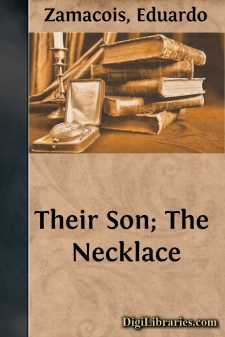Categories
- Antiques & Collectibles 13
- Architecture 36
- Art 48
- Bibles 22
- Biography & Autobiography 813
- Body, Mind & Spirit 142
- Business & Economics 28
- Children's Books 17
- Children's Fiction 14
- Computers 4
- Cooking 94
- Crafts & Hobbies 4
- Drama 346
- Education 46
- Family & Relationships 57
- Fiction 11829
- Games 19
- Gardening 17
- Health & Fitness 34
- History 1377
- House & Home 1
- Humor 147
- Juvenile Fiction 1873
- Juvenile Nonfiction 202
- Language Arts & Disciplines 88
- Law 16
- Literary Collections 686
- Literary Criticism 179
- Mathematics 13
- Medical 41
- Music 40
- Nature 179
- Non-Classifiable 1768
- Performing Arts 7
- Periodicals 1453
- Philosophy 64
- Photography 2
- Poetry 896
- Political Science 203
- Psychology 42
- Reference 154
- Religion 513
- Science 126
- Self-Help 84
- Social Science 81
- Sports & Recreation 34
- Study Aids 3
- Technology & Engineering 59
- Transportation 23
- Travel 463
- True Crime 29
Their Son; The Necklace
by: Eduardo Zamacois
Description:
Excerpt
FEW writers of the tremendously virile and significant school of modern Spain summarize in their work so completely the tendencies of the resurgimiento as does Eduardo Zamacois. "Renaissance" is really the watchword of his life and literary output. This man is a human dynamo, a revitalizing force in Spanish life and letters, an artist who is more than a mere artist; he is a man with a message, a philosophy and a vision; and all these he knows how to clothe in a forceful, masterly and compelling style, which, though not always lucid, always commands. Zamacois sees life, and paints it as it is, sometimes with humor, often with pitiless, dissecting accuracy.
To me, Zamacois seems a Spanish Guy de Maupassant. He tells a story in much the same way, with that grace and charm which only genius, coupled to infinite hard work, can crystallize on the printed page. His subjects are often much the same as those of de Maupassant. His sympathy for what prigs call "low life"; his understanding of the heart of the common people; his appreciation of the drama and pathos, the humor and tragedy of ordinary, everyday life; his frank handling of the really vital things—which we western-hemisphere hypocrites call improprieties and turn up our noses at, the while we secretly pry into them—all mark him as kin with the great French master. Kin, not imitator, Zamacois is Zamacois, no one else. His way of seeing, of expressing, is all his; and even the manner in which he handles the Castillian, constructing his own grammatical forms and words to suit himself, mark him a pioneer. He is a hard man to translate. Dictionaries are too narrow for the limits of his vocabulary. Many of his words baffle folk who speak Spanish as a birthright. He is a jeune of the jeunes. A creative, not an imitative force. Power, thought, vitality, constructive ideals: these sketch the man's outlines. He comes of a distinguished family. The great Spanish painter, of his same name, is a close relative.
His personality is charming. My acquaintance with him forms one of the pleasantest chapters in a life of literary ups and downs. Ruddy, vigorous, with short hair getting a bit dusty; with a contagious laugh and a frequent smile; with a kind of gay worldliness that fascinates; a nonchalant, tolerant philosophy; a dry humor; a good touch at the piano; an excellent singing voice for the performance of peteneras and folk-songs without number; a splendid platform-presence as a lecturer on Spanish literature and customs, Zamacois is an all-round man of intense vitality, deep originality and human breadth. He is a wise man, widely traveled, versed in much strange lore; and yet he has kept simplicity, courtesy, humanity. Spain is decadent? Not while it can produce men, thinkers, writers like this man—like this member of the new school that calls itself, because it realizes its own historic mission, el resurgimiento.
"Nothing binds nations together so securely," he said to me one day, "and nothing so profoundly vitalizes them, as literature and art. Commercial rivalries lead to war. But artistic and literary matters are free and universal. Beauty cannot be appreciated, alone. It must be shared, to be enjoyed. My ambition—or one of my ambitions—is to bring the old world to the new, and to take back the new to the old." He spoke with enthusiasm, for he is an enthusiast by temperament, filled with nervous energy that looks out compellingly from his gray eyes—not at all a Spanish type, as we conceive the typical Spaniard. "I am sorry you Americans know so little of Spanish letters. You have always gone to France, rather than to Spain, for your literary loves....


